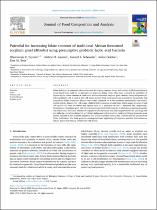Potential for increasing folate contents of traditional African fermented sorghum gruel (Motoho) using presumptive probiotic lactic acid bacteria
Date
2023Author
Fayemi, Olanrewaju E.
Akanni, Gabriel B.
Oelofse, Andre
Metadata
Show full item recordAbstract
Folate deficiency is commonly observed in most developing countries. Lactic acid bacteria (LAB) fermentation of
cereal-based foods could be an alternative to improving folate intake. This study evaluated the possibility of
improving the folate contents of traditional African fermented sorghum gruel (motoho) using indigenous po-
tential probiotic LAB. A total of 220 LAB strains isolated from maize gruel were screened for extracellular and
intracellular folate production. Strains were further examined for in vitro probiotic characteristics and antimi-
crobial activity. Sixteen (16) LAB strains exhibited high production of total folate which ranged between 44 and
180 μg/100 mL with the lowest and highest value in L. plantarum S8 and L. plantarum S49, respectively.
Fermentation of sorghum gruel with folate producing probiotic LAB strains for in situ folate production in motoho
was determined. The folate contents of sorghum motoho fermented with LAB ranged between 13 and 20 μg/100
mL while the control was below 2.5 μg/100 mL. Indigenous LAB strains from traditional African fermented gruel
possess desirable in vitro probiotic properties and ability to produce folates, thus, could be used for natural in situ
folate fortification. This study presents a strategy for future application of indigenous probiotic LAB cultures as
natural means of fortifying cereal foods with folates.

